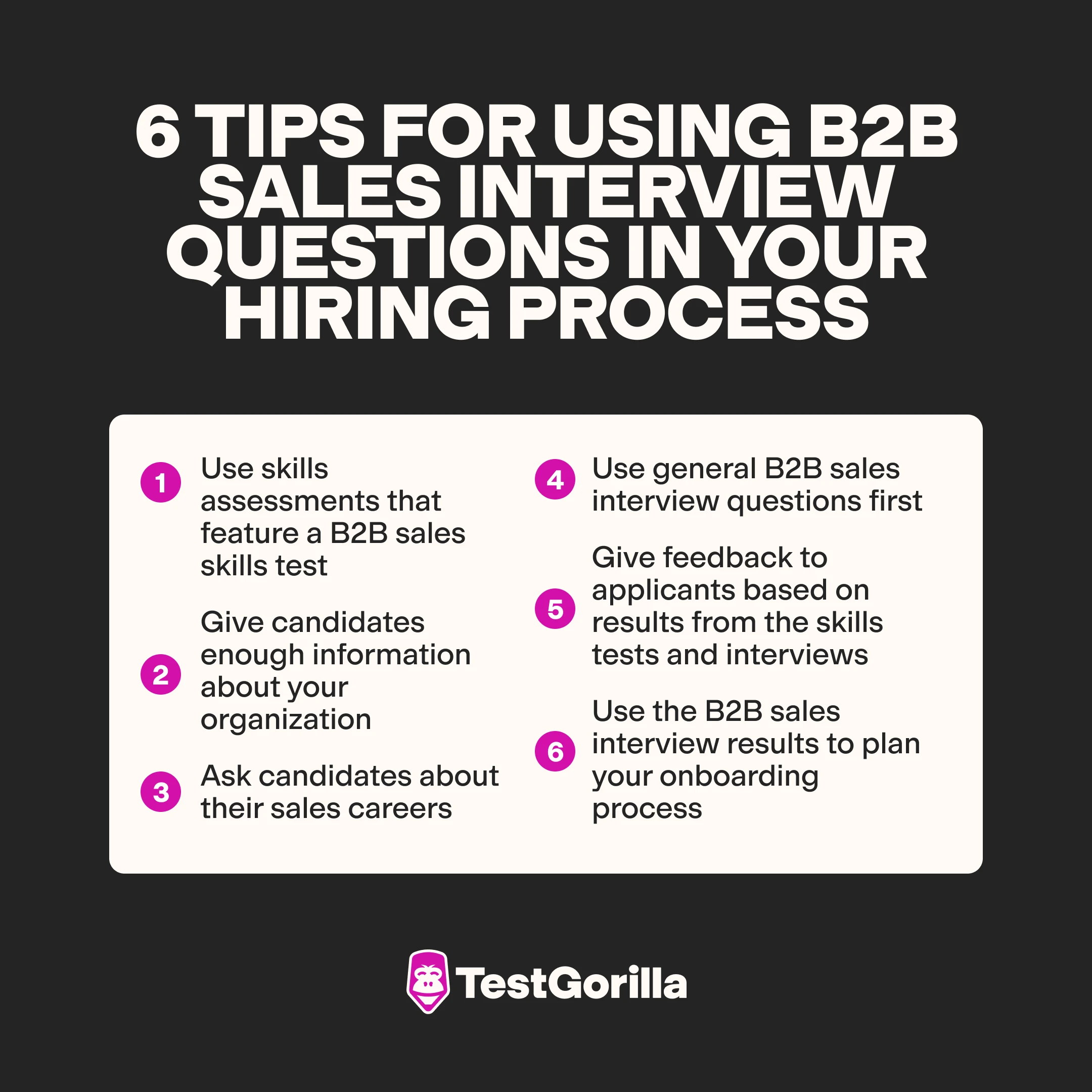101 B2B sales interview questions to ask your applicants
If you’re searching for a B2B sales expert to join your organization and have a meaningful impact on your sales, finding the right match is critical.
A person who has the right B2B sales skill will be able to successfully get new leads, manage prospects, handle objections, and close deals successfully, boosting your profitability.
If you aim to hire the best talent, the best way to do that is to combine two of the most efficient methods to evaluate skills: skills testing and conducting interviews.
And if you’re looking for ideas for the right questions to ask during interviews, you’ve come to the right place: We have prepared a list of 101 B2B sales interview questions in this article that you can use to evaluate your applicants, split into 3 categories.
Table of contents
- 52 general B2B sales interview questions to ask candidates
- 5 general B2B sales interview questions and answers
- 34 B2B sales interview questions related to sales processes
- 5 B2B sales interview questions and answers related to sales processes
- 15 situational B2B sales interview questions to ask applicants
- 5 situational B2B sales interview questions and answers
- 6 tips for using B2B sales interview questions in your hiring process
- 4 skills you should look for when hiring a B2B sales representative for your team
- Hire exceptional talent with the right B2B sales interview questions
52 general B2B sales interview questions to ask candidates
We recommend that you begin the interview with some general questions, like the ones listed in this section. This way, you’ll learn about your applicant’s experience with B2B sales and their career trajectory so far.
Why have you chosen a career in B2B sales?
Describe your B2B sales experience.
Which skills are important for B2B sales roles?
Which soft skills would you say are particularly important for a B2B sales position?
What would your manager say your strongest B2B sales skills are?
What skills would your manager like you to improve?
How do you improve your sales skills?
What do you know about our company?
Why have you decided to leave your current company?
Which words would your team members use to describe you?
Describe your best achievement in B2B sales.
What do you hope to have achieved in five years?
What does your typical work day look like?
Which words would best describe your sales approach?
Do you consider yourself a team player or do you prefer to work individually in a B2B sales environment?
What is your definition of “sales success”?
Who would be your ideal sales mentor?
Who would be your ideal sales team member?
What drives you to succeed in sales?
What intrigues you about this B2B sales vacancy?
What do you dislike about B2B sales?
Is it more important to satisfy customers or make your quota?
What would be your goals for the first month at our company if you get hired?
How would you evaluate your problem-solving skills?
Why do you consider yourself the best candidate for this position?
How do you handle change in an evolving organization?
Who would be your ideal manager?
What sales culture do you thrive in?
What sales culture do you consider a poor fit for you?
Which books have influenced your B2B sales career the most?
Describe a time when you turned a company around or helped it reach an important sales milestone. How did you achieve that?
Describe the most rewarding aspect of sales.
What is your understanding of market analysis?
Explain what Salesforce is.
Explain what HubSpot is.
What is your experience with outbound sales?
How would you describe your customer service skills in a B2B sales environment?
What challenges are you looking forward to in your next role?
Have you ever worked from home in a B2B sales role?
How would you rate your knowledge of business ethics and compliance?
How would you rate your negotiation skills?
Is learning important in B2B sales? Why?
If you could start a company now, which company would you launch?
What are the main elements of a sales process?
Do you have experience working with new clients regularly? Tell me more about your experience.
Do you have experience working with long-term clients? Describe your experience.
What do you consider more valuable from the organization’s perspective, finding new clients or working with long-term clients?
How would you rate your critical-thinking skills?
How would you rate your communication skills?
How would you rate your time management skills when closing sales?
What do you understand by “short sales cycle”?
What do you understand by “long sales cycle”?
5 general B2B sales interview questions and answers
Here’s our selection of five of the general B2B sales interview questions from the previous section, along with sample answers to help you evaluate your applicants.
1. Which skills are important for B2B sales roles?
Candidates should know that negotiation skills are essential for B2B sales roles. They should also mention that closing sales, qualifying leads, and overcoming objections are essential for the success of B2B sales representatives.
2. Which soft skills would you say are particularly important for a B2B sales position?
Some of the soft skills that applicants may mention include:
Excellent communication skills and interpretation of non-verbal cues
3. What would your manager say your strongest B2B sales skills are?
Your applicants may mention several skills in response to this question, such as the ability to qualify leads or close sales.
Look for candidates who have the right hard and soft skills that match your requirements and consider applicants who can describe situations in which they used them.
4. How would you rate your communication skills?
Candidates may mention that they have excellent communication skills, including active listening skills and the ability to understand non-verbal cues. Since communication skills are vital for building relationships with prospective clients, look for candidates who have well-rounded written communication skills.
5. How would you rate your critical-thinking skills?
Strong critical-thinking skills are vital for B2B sales representatives, because they enable them to negotiate efficiently and come up with effective solutions to complex challenges. Do your candidates have the right critical-thinking skills to sell your product or service to other businesses?
The best insights on HR and recruitment, delivered to your inbox.
Biweekly updates. No spam. Unsubscribe any time.
34 B2B sales interview questions related to sales processes
Understanding candidates’ sales techniques in different scenarios is critical when you’re interviewing a B2B sales rep. Ask applicants some of these 34 B2B sales interview questions related to sales processes to find out who is the most knowledgeable.
How do you set meetings with prospects?
What changes would you implement to enhance our website and optimize it for sales?
Explain your prospect-research process.
Which strategies do you use to stay organized?
Have you ever used a customer relationship management (CRM) tool in your selling process?
Do you use any sales metrics to track annual sales goals?
What is your process for generating leads?
What is your experience with lead generation through social media?
How do you refine your sales processes? Are there any websites that you use?
Which questions do you ask prospective clients?
How do you handle customer objections?
How would you establish a relationship with a prospective client?
How do you know when to turn a prospect away?
What is your ratio between cultivating existing customer relationships and pursuing new ones, in terms of the time you spend on each task?
Describe a time you cold called a prospective client. What was your approach?
Which processes do you use to qualify sales opportunities?
Tell me about a challenging target that you set and achieved. What process helped you achieve it?
Have you ever used content as part of your sales process?
Have you ever had to motivate an underperforming team member?
Have you ever had to work with a client who had a different cultural background to you?
Have you ever had to collaborate with other people from your team to close a deal? How did you contribute?
Do you have any experience with sales forecasting? Which processes do you use?
Which processes do you use to manage opportunities?
Which methods do you use to close deals?
What is your negotiation process like?
What techniques do you use to persuade a potential customer to make a purchase?
How do you recognize buying signals?
Which process do you follow to help onboard new customers?
How do you identify prospects’ requirements and qualify leads?
Which methods would you use to shorten the customer buying cycle for our organization?
How would you handle a complaint from a client?
Which approach is best suited for a short sales cycle?
Which approach is the most appropriate for a long sales cycle?
Which method would you use to prioritize clients?
5 B2B sales interview questions and answers related to sales processes
Below, you’ll find a selection of five questions related to sales processes, along with information on the answers you can expect from candidates.
1. Have you ever used a customer relationship management (CRM) tool in your selling process?
Have your candidates already used CRM tools? Can they outline the benefits of using CRMs as part of the B2B sales process?
Can they explain that CRMs can help teams map opportunities, align the sales and marketing teams’ efforts, track marketing campaigns’ efficiency and enhance communication?
2. Which methods would you use to shorten the customer buying cycle for our organization?
Applicants should have a few methods to shorten the customer buying cycle, such as:
Build trust and credibility
Prepare business case documents
Coordinate the buying process with other teams
Discuss options to diffuse points of resistance
3. Have you ever had to collaborate with other teams to close a deal? How did you contribute?
Although not all B2B organizations prioritize team collaboration, applicants should recognize that collaboration is important.
Can your candidates demonstrate a willingness to collaborate and share ideas with marketing teams, developers, and other sales reps to close deals effectively?
4. How do you identify prospects’ requirements and qualify leads?
Asking the right questions and researching prospects’ requirements is essential for successfully qualifying leads. Can your candidates explain that knowing prospects’ problems and using the traditional BANT method can help with lead qualification?
5. Have you ever had to work with a client who had a different cultural background to you?
A B2B sales representative should have no problems working with any client, regardless of their cultural background.
Have your applicants worked with clients from different backgrounds and cultures? Are they capable of working in a diverse environment?
15 situational B2B sales interview questions to ask applicants
You must understand how candidates respond to specific, complex B2B sales challenges and scenarios. Ask them these 15 interview questions to determine if their actions, responses and behaviors align with your expectations.
Have you ever lost a sale or a client? How did you improve and what did you learn?
Have you ever had to manage a sales territory?
Describe a time that you had a conflict with another member of the sales team. How did you resolve it?
Describe a time when you thought of a unique solution to a prospect’s problem.
How would you handle a situation where your client thinks the price is too high?
What would you do if a prospective client with whom you have built a relationship doesn’t have the right level of authority to decide on a purchase?
If you receive a request for a proposal from a company you know nothing about, how would you create an appropriate strategy?
Have you ever had a leadership role in sales? Describe your experience.
Describe a time when your organization was losing to a competitor, but you overtook them.
Have you ever taken a risk during your sales career?
You are given negative feedback on your sales process. How do you respond?
If you were to sell me our product, how would you approach this?
What data do you need before arranging a meeting or a call with a prospect? How would you get the needed information?
You are rejected by a prospect. How do you respond?
How would you gather more information about a new, technical product that our organization offers, to sell its unique features?
5 situational B2B sales interview questions and answers
Below, we’ve selected five situational interview questions and provided guidelines to help you evaluate applicants’ answers during the interview.
1. You are given negative feedback on your sales process. How do you respond?
Applicants should always be open to accepting feedback and look for ways to improve their skills. It’s not easy to receive negative feedback and act on it. Can your candidates show how they have improved their sales process thanks to feedback from others?
2. Describe a time that you had a conflict with another member of the sales team. How did you resolve it?
B2B sales representatives frequently collaborate with other team members to create strategies, but disagreements can happen. Do your candidates have the communication skills required to handle disputes and work efficiently within a team?
3. Have you ever lost a sale or client? How did you improve and what did you learn?
It’s not possible to retain every client or make every sale. Candidates should learn from setbacks and be able to explain how they improved their sales skills. Perhaps your applicants acknowledged that meeting their clients’ requirements is critical, or that frequently checking in with clients is vital. Look for applicants who learned from lost deals.
4. What data do you need before arranging a meeting or a call with a prospect? How would you get the required information?
Applicants should recognize that researching prospects is critical. Can they explain that acquiring a prospect’s professional information is important? Do they recognize that using LinkedIn and researching the prospect’s organization is an important step towards understanding their requirements and making a successful sales pitch?
5. How would you gather more information about a new, technical product that our organization offers, to sell its unique features?
Ask candidates this question to learn how they would research your product’s features. Can your candidates explain that they would learn as much as possible about the product before using their communication skills to explain how its unique features work?
6 tips for using B2B sales interview questions in your hiring process
To help you make the most of your interviews, we’ve prepared six additional tips on how to hire the best B2B sales reps. Here are the six tips you should remember:
1. Use skills assessments that feature a B2B sales skills test
Use skills assessments in your hiring process to evaluate applicants’ skills and shortlist the best ones. When you build your skills assessment, ensure you use a B2B sales test to test your applicants’ sales skills.
2. Ask candidates about their sales careers
First, try to learn more about your candidates’ sales careers before you get to the more difficult questions. Ask them about their experience in sales and consider whether their experience aligns with the requirements of your open role.
3. Use general B2B sales interview questions first
Start the interview with general B2B sales questions before moving on to situational or behavioral interview questions.
4. Take notes of sales candidates’ responses on a scoresheet
Use a scoresheet to note your sales candidates’ responses to your B2B sales interview questions, but tell candidates in advance that you’ll do this.
5. Give feedback to applicants based on results from the skills tests and interviews
Once you’ve completed the interview stage, give tactful feedback to rejected applicants and include information on the results from their skills tests and interviews. This will help you enhance the candidate experience and maintain your employer brand.
6. Use the B2B sales interview results to plan your onboarding process
When you’ve hired the right B2B sales representative for your organization, look at the interview results to tailor the onboarding process to their specific needs.
4 skills you should look for when hiring a B2B sales representative for your team
Before we reach the end of the article, we’d like to share with you the four vital skills you should look for when hiring a B2B sales representative for your team.
1. Negotiation skills
Strong negotiation skills are fundamental for any sales role, including B2B sales.
Can your applicants demonstrate skills in maintaining a discussion, influencing prospects and businesses, leveraging prospects’ psychological predispositions, and using their emotional intelligence to overcome objections and close deals successfully?
2. Communication skills
Communication skills are critical for making a sale and negotiating with businesses.
Do your applicants have the required communication skills to close sales effectively, including the ability to read non-verbal cues? Does their communication etiquette and style match those of your business?
3. B2B sales skills
Obviously, B2B sales skills are vital for candidates’ success in B2B sales. Can your applicants qualify leads, overcome objections, manage opportunities, and close deals?
4. Motivation
It’s not always easy to keep motivation levels high, but it’s a crucial attribute in B2B sales.
Do your applicants’ expectations align with what your company offers? You can use our Motivation test to find out.
Hire exceptional talent with the right B2B sales interview questions
It’s not easy to hire exceptional B2B sales reps, but there are ways to simplify the process.
Using the right set of B2B sales interview questions can make your hiring process much more efficient, especially if you use them in combination with skills testing. Explore TestGorilla’s test library to select the best skills tests for the role you’re looking to fill.
When you start onboarding new hires you can use your candidates’ responses to your interview questions and the results from the skills tests to create training sessions tailored to their needs.
With skills tests and the right B2B sales interview questions, hiring the best candidate doesn’t have to be difficult. Get started with TestGorilla for free today and start making better hiring decisions, faster and bias-free.
You've scrolled this far
Why not try TestGorilla for free, and see what happens when you put skills first.


















